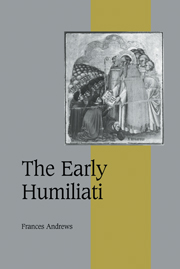Book contents
- Frontmatter
- Contents
- Acknowledgements
- List of abbreviations
- Map
- Introduction
- 1 Tradition and history
- 2 The beginnings of the Humiliati: the twelfth-century evidence
- 3 Quia in nullo peccabant: the inspection and approval of the Humiliati 1199–1201
- 4 Rules
- 5 In search of communities
- 6 New members and profession of vows
- 7 Unity and uniformity: the development of a centralised order
- 8 The Humiliati and the Church in the localities
- Conclusion
- Appendices
- Bibliography
- Index
- Cambridge Studies in Medieval Life and Thought: Fourth Series
6 - New members and profession of vows
Published online by Cambridge University Press: 02 November 2009
- Frontmatter
- Contents
- Acknowledgements
- List of abbreviations
- Map
- Introduction
- 1 Tradition and history
- 2 The beginnings of the Humiliati: the twelfth-century evidence
- 3 Quia in nullo peccabant: the inspection and approval of the Humiliati 1199–1201
- 4 Rules
- 5 In search of communities
- 6 New members and profession of vows
- 7 Unity and uniformity: the development of a centralised order
- 8 The Humiliati and the Church in the localities
- Conclusion
- Appendices
- Bibliography
- Index
- Cambridge Studies in Medieval Life and Thought: Fourth Series
Summary
… et in osculo fraternitatis eam osculauit …
The kiss of fraternity marking the reception of a new member into a community is both a public, ritualised act and a very private, even intimate moment and the sources which record it carry this same dual value for the historian. On the one hand records of entry allow a brief insight into the personal life of a community, divulging names and relationships, the networks to which individuals and communities belonged and the aspirations of new members. On the other, by recording the words and rites used, they reveal the variations in practice and evolution of uniform observances which mark the emergence of an identity as an ordo Humiliatorum. This chapter uses the records of entry into houses of the First and Second orders of the Humiliati to explore these two issues. It looks first at the evidence for vows and rituals of profession as they moved towards uniform, regular, observance and second at the more personal questions of motivation and the networks of friends and family to which the postulants belonged.
Uneven document survival makes it impossible to draw a picture applicable throughout northern Italy. A context can be established by reference to a small sample of sources from quite a wide area, but the focus is inevitably on the district of Verona, where an unusually large number of records for the entry of new recruits survive. This emphasis may disguise other local variations, but it is nonetheless an appropriate study, both because of the lack of general awareness of such records in past writing and because it will provide a framework against which any future discoveries of documentation may be assessed.
- Type
- Chapter
- Information
- The Early Humiliati , pp. 173 - 201Publisher: Cambridge University PressPrint publication year: 2000



